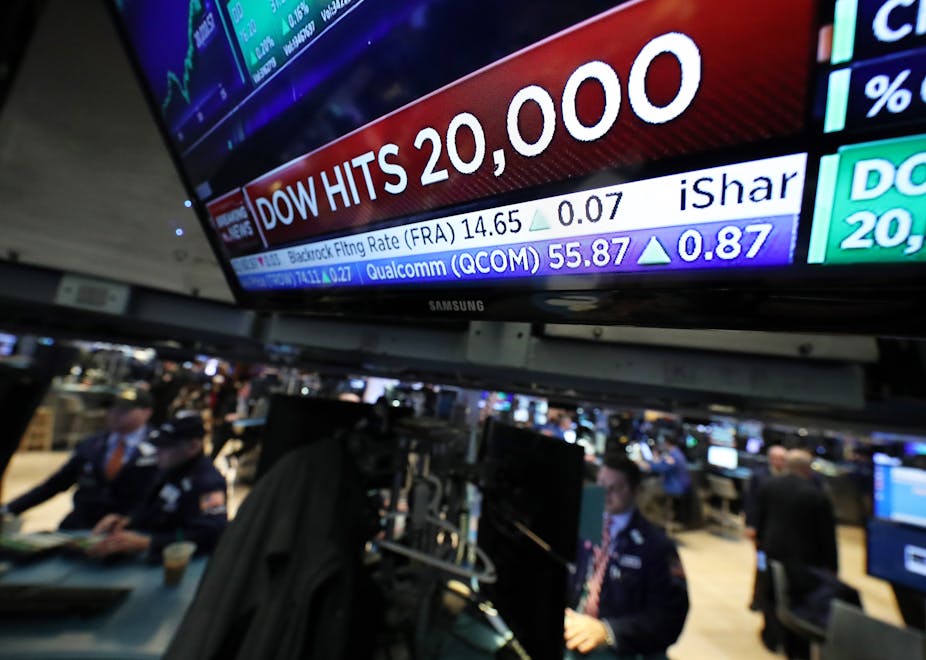In the middle of the pomp of a presidential inauguration and the fervour of the mass protests that followed you might have heard the cheering of financial traders as the US benchmark stock index, the Dow Jones Industrial Average surged past 20,000 points for the first time. This symbolic moment signals a hope among investors that Donald Trump’s pro-business policies will fuel the US economy. Other key markets, the S&P 500 and the tech-heavy Nasdaq also saw significant gains.
Since the arrival of Trump in the White House, both household and business sentiment indicators have risen. Bloomberg analysis of small businesses and consumer confidence reports a substantial boost to optimism. And Trump’s pledges on deregulation and tax reforms have been perceived as a step in the right direction by business. Both have been cheered by corporate leaders, including Randall Stephenson, the CEO of telecoms giant AT&T, and JP Morgan boss Jamie Dimon.
The “Make America Great Again” slogan seemed to be resonating with the stock market fraternity; “America First” rhetoric pushing investor sentiment towards euphoric levels.

Obstacles, of course
However, the excitement that has greeted a new, “pro-business” administration has many hurdles to clear. The first test comes in the form of Trump’s tough stance on immigration and the imposition of travel restrictions on seven, mainly Muslim countries. There has been widespread condemnation, from Canada, Germany, France, the UK and from within the US itself. US companies, notably auto companies which boast large numbers consumers and staff of Arab origin, have largely stayed silent on the matter. Car makers during the height of the 20th century industrial boom, especially Ford, hired workers from Yemen and other parts of the Middle-East. This gave rise to a new Arab community around Ford’s factory in Highland Park, Michigan that grew alongside the booming sector.
But some have been noisy in opposition, particularly tech firms. The CEOs of Google and Microsoft have shared their dismay over the policy, while Amazon chief Jeff Bezos – concerned about the impact on staff around the world – is supported Washington state’s legal action against the ruling.

The impact of all this is uncertain, of course. But it is hard not to conclude that the outcry over Trump’s immigration position, and the challenge from the tech industry, has had an impact on market sentiment. The Dow Jones Industrial Average has since fallen back below the 20,000 level and now sits at about 19,900 points. The political wrangle that followed, including the firing of acting Attorney General Sally Yates over the immigration order, also caused jitters in the market.
But let us assume for now that the Trump administration’s “business friendly” rhetoric helps to smooth over the shock: Wall Street won’t have to wait long before investor resolve is tested again.
Trade offs
This will likely come from Trump’s position on global trade. The president has been particularly contemptuous of efforts by China and Japan to weaken their currencies to obtain an advantage over of the US. He directly criticised the Bank of Japan for using aggressive monetary policy to devalue the Yen with the intention of boosting Japanese exports and substantially reducing the cost the imports. The difficulty for stock market traders lies in assessing the veracity and significance of the Trump’s interventionist approach to monetary policy, beyond its political propaganda. The US dollar saw a decline against the Yen before recovering its ground. This indicates some nervousness perhaps, but most of all a lack of certainty.

There is more confidence over Trump’s oft-repeated commitment to reduce the budget and trade deficits, which stand at US$552 billion and US$45.2 billion, respectively. He may yet take a leaf out of Japan and China’s monetary policy book. Devaluing the dollar, equal to the devaluation of the Yen, to encourage US exports would certainly address the trade deficit.
An interventionist approach is also on the cards. Trump has vowed, since being elected, to introduce import tariffs to curb what he views as exploitative imports from countries like China and Japan, which are destroying the US balance of payments. Trump’s tough rhetoric gives US trading partners cause for concern. Haruhiko Kuroda, governor of the Bank of Japan, warned that Trump’s protectionist measures could have a detrimental impact on international trade, which might lead to global economic deceleration. Whether the US can “win” in that environment is difficult to guess.
The Trump administration’s first week ebbed and flowed on investor confidence, public outcry and trade rhetoric. The Dow stock index record was a bright spot, but many testing times lie ahead. Hopes for growth-lifting stimulus, deregulation and tax reforms will have to battle with harsh realities of a divisive immigration policy and the potential for a contentious and unpredictable global trade war. Wall Street remains bullish – an avowedly business-friendly president is not to be sniffed at after all – but fingers will be hovering over the sell button if the Trump mantra starts to wobble.

